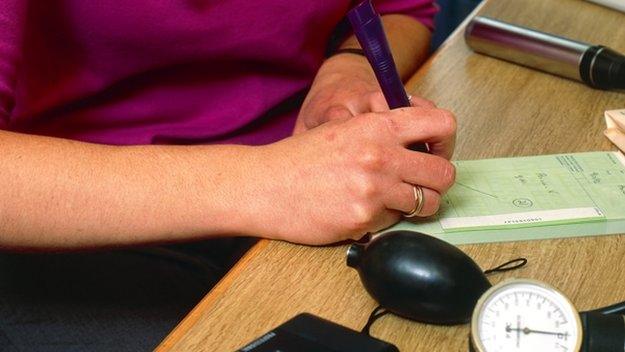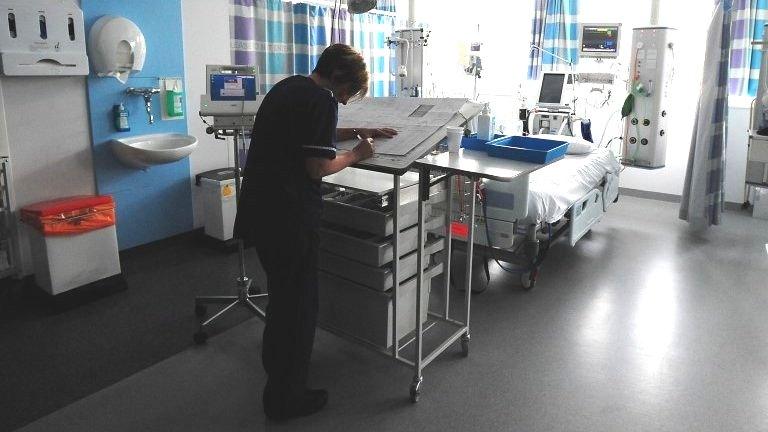Is there a Monday to Friday culture in the NHS?
- Published

At times, the seven-day debate can seem like a Punch and Judy show. One minute Health Secretary Jeremy Hunt is accusing hospital doctors of being part of a Monday to Friday culture.
The next, medics are saying "oh no we're not" and taking to Twitter and Facebook to demonstrate how they are toiling away while much of the rest of the country has its feet up at the weekend.
So who is right? In their own ways, both are. As anyone present in a hospital on a Friday evening can testify, there is a clear sense of a change of pace. Machines are turned off, staff slip away and patients settle down as the hurly, burly of the week gives way to the weekend.
In one respect there is nothing wrong with this. Much of the non-emergency side of a hospital's work (knee and hip replacements for example) stops or at the very least slows at weekends. But this is not really the issue.
Nor is there any real suggestion - despite the rhetoric being used - that there is no activity taking place all. After all, there are parts of the hospital where there is little let up no matter what day it is.
Any member of an A&E department will tell you Friday night is one of the worst shifts as patient numbers are swollen by those who are worse for wear after a heavy night drinking. And, of course, anyone needing immediate life-saving treatment will get it. Quickly.
Urgent care
Instead, what is at the heart of the seven-day debate is the care that lies in between these two. It is generally being referred to as urgent care.
That term covers a range of services from tests such as MRI and CT scans to specialist procedures like urgent radiotherapy, endoscopies and complex dialysis and heart treatments. In many places, getting access to these at the weekend is difficult.
While they don't all need a consultant to carry them out, they do often need consultant input and oversight. And this is where the problem lies.

As the system is currently set up, consultant cover drops significantly at weekends. A recent Freedom of Information request by the Daily Telegraph found in general medicine it fell five-fold, external.
The result of this is that the consultants in work are stretched more thinly and junior doctors have to do more.
That means these vital tests and procedures sometimes cannot take place until Monday comes. The suspicion among experts is that this is one of the reasons why, as the study, external published by the British Medical Journal on Sunday suggests, patient care may be being hampered.
Another area of concern is the loss of regular review and quick assessment by specialist consultants to ensure those being admitted get the right treatment from the start. There are on-call rotas so junior doctors can always refer up, but this does not always happen.
As in any job, there is a reluctance to be seen to bother "the boss" too much or - as one doctor put it to me recently - "you don't want to be seen as a wimp for calling the consultant all the time".
Genuine anger
But none of this means that the genuine anger and upset of doctors should be dismissed.
It shouldn't need saying, but up-and-down the country there are thousands of consultants - and other staff for that matter - going above-and-beyond the call of duty - as this film of Tan Arulampalam demonstrates.
Day in the life of a Consultant on call in Colchester
He is a colorectal and general surgeon and is regularly "on call" at weekends. However, he usually finds himself working a full day and only goes home at night to sleep.
The notion of opting out of weekend work (as the consultant contract allows in certain circumstances) is alien to doctors like him.

NHS weekend: Want to know more?
Visit the BBC's special report page on 7-day services (This link will not work on the BBC app but some of the key content can be seen below)

It's also worth noting that things have begun to change. Increasingly the most forward-thinking hospitals - with the full co-operation of their senior doctors - have already started ensuring there is more seven-day working available.
But this costs money. It is estimated that seven-day working costs hospitals between 1.5% to 2% of their budget, mainly because of the extra staff costs involved.
At a time when many trusts are running up deficits, that is money that is going to be difficult to find.
The question now is how far and how quickly the seven-day push continues. In the next few weeks we should find out if ministers and doctors can reach agreement on the consultant contract and then later in the autumn the government will set out its spending plans in more detail. It is likely to be a crucial period.
- Published16 July 2015

- Published16 July 2015
- Published21 June 2015

- Published19 June 2015

- Published19 June 2015
- Published30 September 2014

- Published15 December 2013
